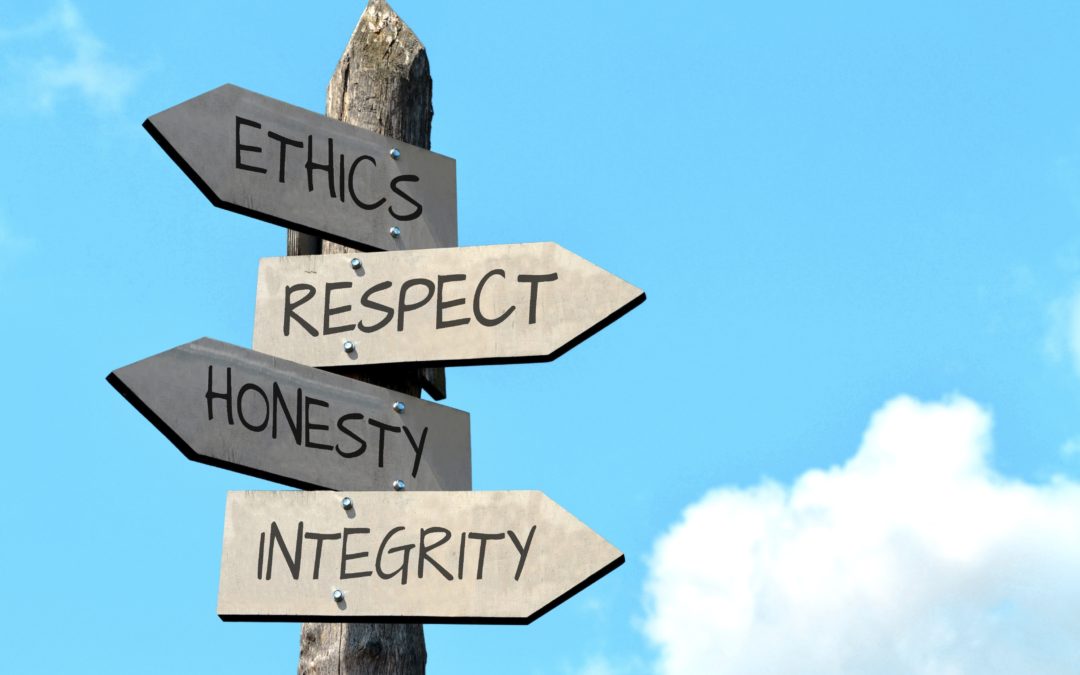The discussion of ethics has returned once again to the forefront of our consciences. The headlines repeatedly highlight numerous examples of ethical violations. How does one begin to resolve these challenges? How do we resolve the ethical crossroads within our workplace?
To begin the process of ethical discussions and resolutions, Dr. W. Keith Kraseman, Professor of Philosophy at the College of DuPage has a reasonable solution. “The return to ethical principles and moral values is a major step towards the resolution of most human problems.”
Ethics are the rules of right conduct for transacting goods and services at the corporate and international levels of exchange. Sounds easy enough, but is it really? Does your organization have rules of conduct for transacting goods and services at every level? Are consequences enforced when the codes of conducts have been violated?
A great way to return to ethics is to acknowledge the core values that create the foundation of ethics.  Core values provide solid reference points for evaluating the ethical implications of a given situation. Because they are general they can be applied to a variety of situations and they provide a valuable guide to conduct.
Core values provide solid reference points for evaluating the ethical implications of a given situation. Because they are general they can be applied to a variety of situations and they provide a valuable guide to conduct.
While developing a code of conduct, you can simply follow the core values of ethics which has been developed by Michael Josephson, the founder of the Josephson Institute of Ethics.
Honesty
As children, we constantly heard the phrase “honesty is the best policy.” Whether it is was our parents, teachers, or colleagues, everyone is really interested in knowing whether or not they can trust what we are telling them. Telling the truth is very important. Where we get into trouble is when we say to ourselves or others “it is OK to shade the truth from time to time.” If we continue to avoid telling the truth, then we will continue to wonder why no one trusts us. Honesty inspires trust.
Fairness
Our entire childhood was surrounded by fairness which included playing by the rules, taking turns, sharing with one another, being open-minded, and listening to others. Fairness gives you the ability to be objective as it relates to your own self-interest and trains you to treat others justly and equitably. Impartiality to one’s own needs is the hallmark of fairness.
Integrity
Are you living the truth? When no one is looking, who are you? Are you really who you say you are in public and in private? Or do you play both sides of the fence to see how much you can “get away with?
Promises
The concept of branding implies that the company promises to deliver a quality product or service. Your leadership brand, or reputation, relies on promises. Do your keep your word? Do you keep your promise to meet a deadline? Are you credible?
Caring For Others
“Caring is the heart of ethics,” says Josephson. “It is scarcely possible to be truly ethical and not genuinely concerned with the welfare of others. People who consider themselves ethical and yet lack a caring attitude towards individuals tend to treat others as instruments of their will. They rarely feel an obligation to be honest, loyal, or fair or respectful except insofar as it is prudent for them to do so.”
Ethics will always give your organization, industry, and you the competitive advantage and instant credibility.
During these tides of change, it takes courage to be ethical. Remember, we must earn credibility, not expect it.
Michele Wierzgac, MSEd, speaker and author, promises that you will leave her solution-driven keynotes and workshops with at least one passionate, life transforming, leadership tool – something that will change the way you seek out a solution and practically apply it without getting stuck.
Email Michele at michele@micheleandco.com or give her a call at (708) 710-7055!






